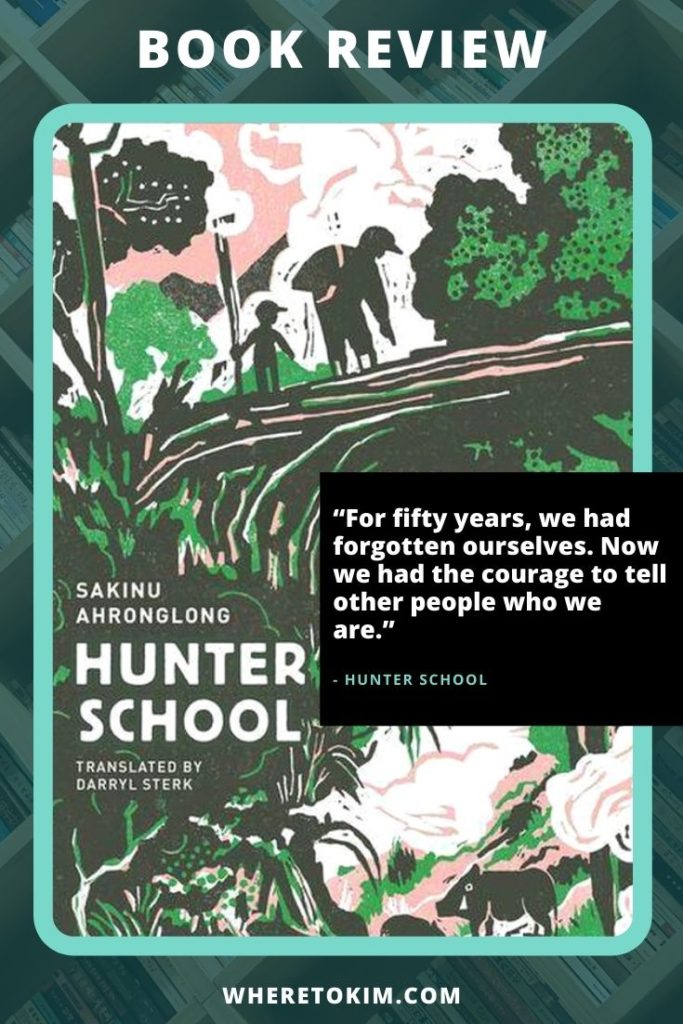Hunter School by Sakinu Ahronglong is about the lore, hardships, and dreams for the future of a descendant of the Paiwan, an indigenous tribe of Taiwan.
Hunter School synopsis
Hunter School is a timely piece of fiction, drawing on the recollections, folklore, and autobiographical stories of an aboriginal Taiwanese man aiming to reconnect with his lost tribal identity, a Paiwan identity lost in the name of development.
It is impossible to be unaware of the effect of development, invariably at the hands of outsiders, upon the lands, inhabitants and very nature of faraway climes. Hunter School shows us first-hand the immediate and long-reaching effects of such changes upon an indigenous people. The fabric of the community is changed, its balance and its self-sufficiency undermined, and confusion reigns. A common theme running throughout this charming but important book is that of a young man learning about himself and his heritage from the past, elders, ancestors, and nature itself.
Book review
Author Sakinu Ahronglong is Paiwan, an indigenous tribe of Taiwan. This tribe has been in cultural hibernation for half a century because Paiwan villages were invaded by foreign culture after the rule of Japan and China. His mission is to reconstruct Paiwan culture and help people reconnect with nature, and he founded the Hunter School to do so.
Stories
Deeply ingrained in the stories is the coexistence of man and animal, and man and nature. You feel like you’re attending hunter school yourself, and along the way you learn some humility and respect: be one with nature, don’t place yourself above animals, and try to see it from their point of view. Hunting philosophy class 101: “Relate to each creature in nature like a fellow person.” And as such, it won’t surprise you when the hunter says that you can’t blame the disappearance of flying squirrels on humans alone. The squirrels are to blame, too. If only these squirrels had paid better attention in flying squirrel college they would have been more elusive.
The short stories in part one are lighthearted and resemble anecdotes – not quite fables – that share a rich culture. With each story, you learn new cultural aspects as you follow the studious but reluctant boy, the hunting father, and the wise grandfather. The key lesson here is that you should be grateful for nature and respect your ancestors.
The second part shows the hardships the author faced as a Paiwan in his contact with other cultures, and the third part shows his determination to stand up for what he believes in, including his hopes and dreams for the future. Most of the stories are very interesting and help preserve valuable knowledge.
What I liked less are the many paragraphs telling the reader about the decline of the village and the disappearance of the traditional culture of Paiwan. It becomes repetitive because it is mentioned in most stories. Why doesn’t the author trust readers to read this sentiment between the lines? These paragraphs slow down the stories. The writing style isn’t always that great either; more is told than shown. This allows you to sympathize with the experiences, but if you haven’t experienced it yourself, you can’t empathize with the angst of a child from the mountains visiting Taipei.
Reflection
One of the themes that the Hunter School got me thinking about is change. Is all change progress? Do things have to stay the same? People often long for the outcome of the road not taken, while reminiscing about good things of the past (which may not have been so good). You can revive what was lost, but if the environment has changed, are you creating something real or more of a museum-like experience? Is it even possible to restore what was lost? Suppose I have the opportunity to restore Dutch society exactly as it was in 1930, is that something I should want?
The author values his origins and ancestry, and I like how in one of the later stories he realizes something about the balance between ancestry and identity.
Conclusion
I value the cultural significance of this collection of stories, but I ended up giving it a three-star rating because of the writing style and repetition. I would say that this book is a must-read for anyone visiting Taiwan and I will reread the stories in Hunter School many times in the future because they do appeal to me. Some parts of the stories I would like to rewrite so that they appeal more to the reader, while still conveying the same message.
To everyone involved in writing, translating, and publishing this book: thank you for sharing these stories with the world. When I visit Taiwan in the future, I will do so with a better understanding.
Interested?
Get your copy of Hunter School from Amazon.
Book details
Title: Hunter School
Author: Sakinu Ahronglong
Translator: Darryl Sterk
Publisher: Honford Star
Pages: 182
ISBN (13): 9781999791285
Publication date: 1 May 2020







